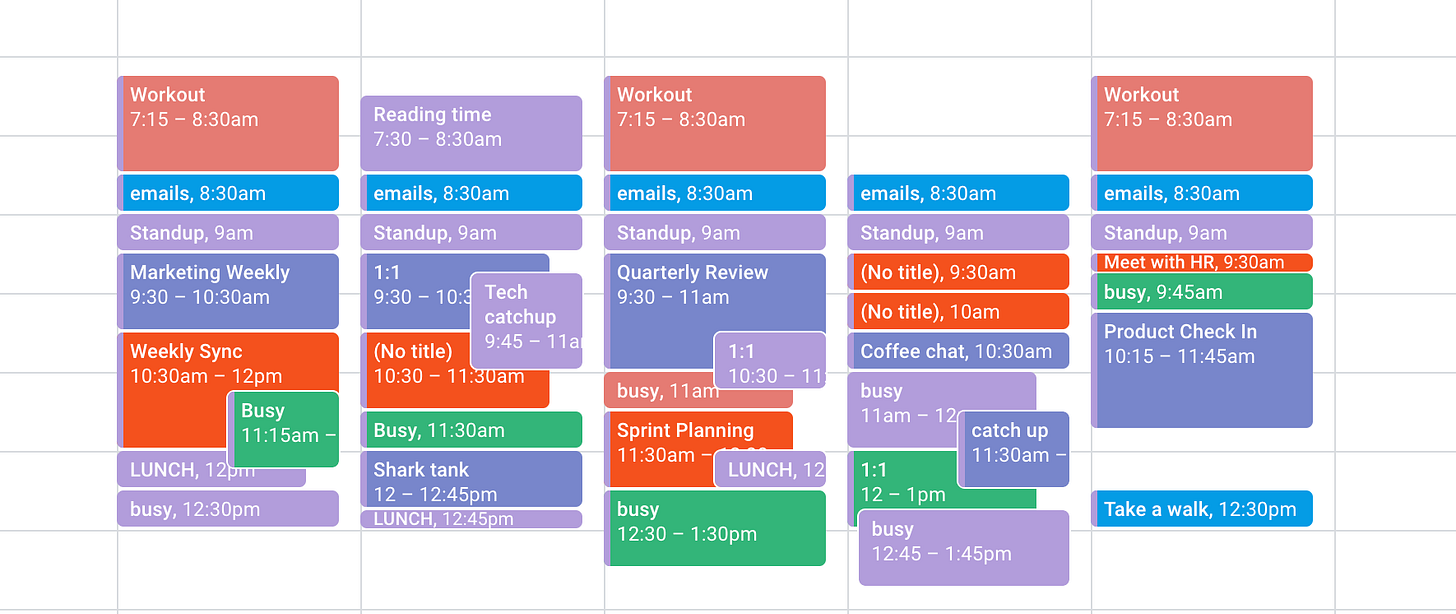If your calendar has white space, are you even working?
For three years, I made resolutions to write. I blocked my calendar, downloaded the Forest app, and read over 15 books on productivity. Yet I never wrote a single thing.
Instead of becoming a writer, I became a productivity guru. Bullet journaling, power naps, social media cleanses. I was extremely efficient at knocking tasks off my list, but writing still eluded me. Which brings me to an interesting epiphany.
Productivity is unproductive.
Let me explain. What I mean by “productivity” is the type synonymous with “busyness”. Crushing to-do lists, firing off emails, organizing our spice drawer. We are so frenzied about getting things done that we never do the things that matter. We want to publish a novel, but instead we scroll Instagram and reorganize our spice drawer.
This is not news to anyone, we all know how distracted and busy we are. But if you are like me, this knowledge alone did not inspire change. It took two revelations to give me the jolt I needed to sit down and publish my first piece.
Revelation #1: Productivity tools make us less productive
Courtesy of Darius Foroux
40% of all billion-dollar startups build products aimed at productivity.1 We’ve been convinced that glossy interfaces and cutesy emojis make us more impactful employees, but the truth is, they have diminishing returns.2 Confluence doesn’t save you any more time than Google sheets, and the American Airlines app doesn’t keep your plane from getting delayed (although if anyone builds an app that does, please call me. I will be your first investor).
There’s nothing to feel bad about here - these tools have hundreds of employees whose entire job is to figure out how to entice you to spend more time on their app. The takeaway here is that doing thoughtful, impactful work generally doesn’t involve fancy tools. It requires patience, diligence, and hard work.
Revelation #2: Thinking about productivity makes us less productive
Thinking about productivity makes us feel good. It makes us feel so good that we lose interest in actually doing the work.3 I would happily read five books on productivity to help me get in the mood to write, and six months later nothing was written. This is because positive visualization lowers our blood pressure, which drains our energy and willingness to exert effort.
We work hard because it gives us a rush to accomplish something. But fantasizing about inbox zero also gives us a rush. I spent so much time thinking about writing productively, I convinced my brain I’d written a dissertation. In reality, I hadn’t written a word.
Do less, not more
For the 4th year in a row, I put “get back into writing” as a resolution. And finally, I started to write. So what changed for me?
I let go of being efficient. I acknowledged that writing was going to be hard. I allowed my inbox to pile up, I took walks, I slowed down my time horizon for accomplishing goals from daily to yearly. Modern productivity is all about optimization, but this prohibits thoughtful work. To spend more time on the things that matter, we have to do less of everything else.
So pick up that project you’ve been putting off, and throw your (silenced) phone in a drawer. Close Gmail and Slack, and set a timer for 30 minutes. Let’s get comfortable with discomfort, and see where it takes us.
excerpt from Super Founders by Ali Tamaseb
https://www.vox.com/recode/2019/5/1/18511575/productivity-slack-google-microsoft-facebook
https://www.sciencedirect.com/science/article/abs/pii/S002210311100031X?via%3Dihub






